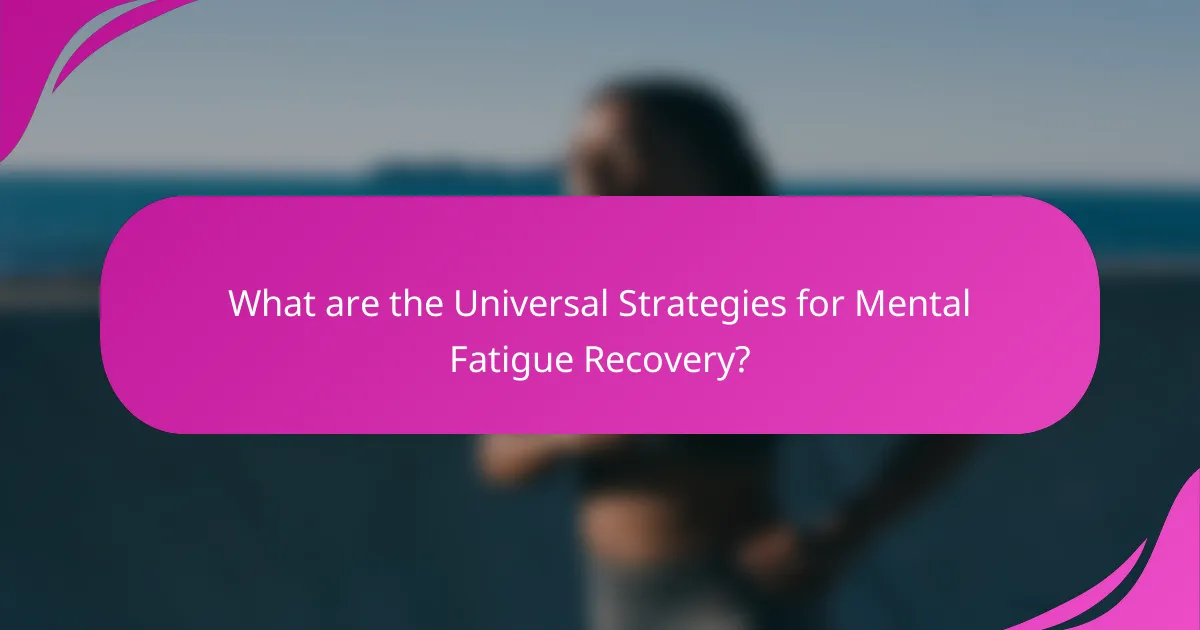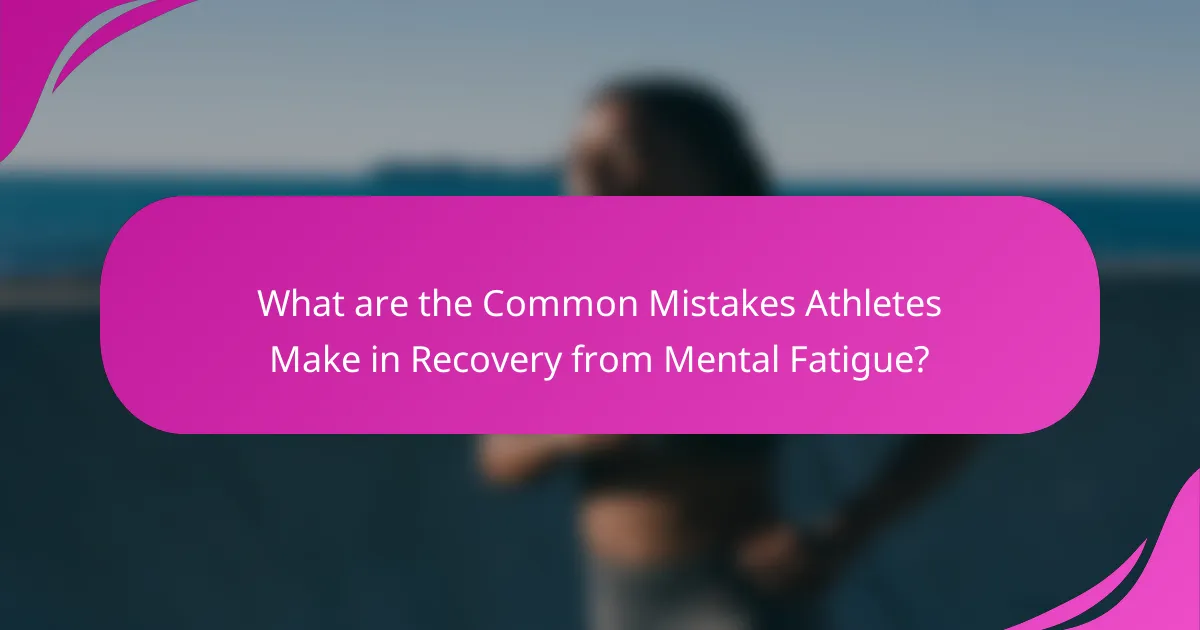Mental fatigue can severely impact athletic performance by diminishing focus and motivation. This article explores effective recovery strategies, including varied training routines, mental breaks, and mindfulness techniques. Athletes will learn how to enhance cognitive function and resilience, ultimately improving their overall performance. Prioritising mental recovery is essential for sustained athletic success.

What is Mental Fatigue and How Does it Affect Athletic Performance?
Mental fatigue significantly impairs athletic performance by reducing focus, motivation, and decision-making abilities. Recovery strategies include mental breaks, varied training routines, and mindfulness practices. These approaches help restore cognitive function and enhance overall performance. Athletes should prioritise mental recovery as part of their training regimen.
What are the symptoms of mental fatigue in athletes?
Mental fatigue in athletes manifests through various symptoms, including decreased motivation, irritability, difficulty concentrating, and increased perceived effort during training. These signs indicate the need for effective recovery strategies. Athletes may also experience emotional exhaustion and changes in sleep patterns, which can further impact performance. Recognising these symptoms is crucial for implementing timely interventions.
How does mental fatigue differ from physical fatigue?
Mental fatigue involves cognitive exhaustion affecting decision-making and focus, while physical fatigue pertains to bodily tiredness impacting strength and endurance. Athletes often experience both types of fatigue, but recovery strategies differ. Mental fatigue requires techniques like mindfulness and cognitive breaks, whereas physical fatigue benefits from rest and nutrition. Understanding these distinctions helps athletes implement effective recovery strategies tailored to their needs.

Why Do Athletes Often Experience Mental Fatigue?
Athletes often experience mental fatigue due to repetitive training and competition demands. This fatigue can hinder performance and recovery. To combat mental fatigue, athletes can implement several strategies.
First, incorporating variety in training routines can stimulate mental engagement. This includes cross-training, changing workout environments, or trying new sports. Second, establishing a balanced schedule with adequate rest and recovery periods is crucial. Mental breaks can enhance focus and motivation.
Mindfulness techniques, such as meditation or visualisation, can also reduce stress and improve mental resilience. Finally, seeking support from coaches or sports psychologists can provide valuable perspectives and coping mechanisms. These strategies help athletes manage mental fatigue effectively.
What are common triggers of mental fatigue in sports?
Common triggers of mental fatigue in sports include repetitive training, lack of variety in workouts, high-pressure competition, inadequate recovery time, and mental exhaustion from strategy overload. These factors lead to diminished performance and increased risk of burnout. Athletes should incorporate diverse training methods and prioritise recovery to combat these triggers effectively.
How does training intensity contribute to mental fatigue?
Training intensity significantly impacts mental fatigue, as higher intensity can lead to greater cognitive strain. Athletes often experience mental fatigue when training sessions are excessively demanding, which affects their performance and recovery. This fatigue results from the brain’s response to physical exertion, where increased intensity can deplete mental resources. Strategies to mitigate this include varying training loads and incorporating adequate rest periods to optimise recovery and maintain mental sharpness. Balancing intensity helps in sustaining both physical and mental performance over time.

What are the Universal Strategies for Mental Fatigue Recovery?
To recover from mental fatigue, athletes should implement diverse strategies that challenge their routine. Techniques include scheduled breaks, mindfulness practices, varied training regimens, and goal reassessment. These methods promote cognitive refreshment and enhance performance. For instance, integrating rest days and mental exercises can significantly improve focus and resilience.
What role does sleep play in recovery from mental fatigue?
Sleep is crucial for recovery from mental fatigue, as it restores cognitive function and enhances performance. Quality sleep promotes memory consolidation, emotional regulation, and decision-making. Research indicates that athletes who prioritise sleep experience improved focus and reduced reaction times, directly impacting their training and competition outcomes. Additionally, sleep deprivation can lead to increased stress and decreased motivation, hindering recovery efforts. By incorporating adequate sleep into their routines, athletes can effectively combat mental fatigue and optimise their overall performance.
How can nutrition improve mental recovery for athletes?
Nutrition significantly enhances mental recovery for athletes by providing essential nutrients that support cognitive function and mood stabilization. Key nutrients like omega-3 fatty acids, antioxidants, and B vitamins play unique roles in reducing mental fatigue and improving focus. For example, omega-3s found in fatty fish can lower inflammation, which is linked to cognitive decline. Incorporating a balanced diet rich in these nutrients can lead to improved mental resilience, enabling athletes to recover more effectively from both physical and mental exertion.
What are effective relaxation techniques for mental fatigue?
Effective relaxation techniques for mental fatigue include deep breathing, progressive muscle relaxation, mindfulness meditation, and gentle yoga. These methods help athletes recover by reducing stress, enhancing focus, and improving overall mental clarity. Incorporating these practices regularly can lead to significant improvements in mental performance and resilience.

What Unique Approaches Can Athletes Take to Combat Mental Fatigue?
Athletes can combat mental fatigue through unique approaches like mindfulness, varied training routines, and cognitive behavioural techniques. Mindfulness practices enhance focus and reduce stress, while varying training keeps athletes engaged and motivated. Cognitive behavioural techniques help in reframing negative thoughts, promoting a positive mindset. These strategies not only address mental fatigue but also improve overall performance and resilience.
How can mindfulness practices enhance recovery?
Mindfulness practices significantly enhance recovery by reducing mental fatigue and improving focus. Techniques such as meditation and deep breathing promote relaxation, which aids in mental clarity. Research shows that athletes who incorporate mindfulness report lower stress levels and increased resilience. This unique attribute of mindfulness fosters a positive mindset, essential for effective recovery strategies.
What innovative technologies are available for mental recovery?
Innovative technologies for mental recovery include virtual reality therapy, neurofeedback, and mobile mental health apps. These tools enhance recovery by providing immersive experiences, real-time brain activity monitoring, and accessible support. Virtual reality therapy allows athletes to practice coping strategies in safe environments. Neurofeedback trains individuals to regulate brain function, promoting mental clarity. Mobile apps offer personalised mental health resources and tracking features, improving engagement in recovery strategies.

What Rare Techniques Have Proven Effective for Mental Fatigue Recovery?
Mindfulness meditation, cognitive restructuring, and nature exposure are rare techniques effective for mental fatigue recovery in athletes. Mindfulness meditation enhances focus and reduces stress, improving cognitive function. Cognitive restructuring shifts negative thought patterns, fostering resilience. Nature exposure revitalises mental energy through restorative environments. These approaches offer unique benefits, promoting holistic recovery for athletes facing mental fatigue.
What is the role of cognitive training in recovery?
Cognitive training plays a crucial role in mental fatigue recovery for athletes by enhancing focus and decision-making. This training helps athletes adapt their mental strategies, leading to improved performance under pressure. Research indicates that cognitive training can increase neural efficiency, allowing for quicker reactions and better problem-solving abilities. As a result, athletes can recover from mental fatigue more effectively, ultimately enhancing their overall resilience and performance.
How can creative outlets aid in mental recovery?
Creative outlets significantly enhance mental recovery by providing athletes with a means to express emotions and relieve stress. Engaging in artistic activities, such as painting or writing, fosters a sense of accomplishment, which can counteract feelings of fatigue. These outlets serve as unique strategies to break the monotony of rigorous training, encouraging cognitive flexibility. As a result, athletes may experience improved focus and resilience, essential for mental recovery.

What are the Common Mistakes Athletes Make in Recovery from Mental Fatigue?
Athletes often repeat ineffective recovery strategies, leading to prolonged mental fatigue. Common mistakes include neglecting rest, failing to diversify recovery methods, ignoring mental health support, and not tracking progress. These oversights hinder optimal recovery and performance. Addressing these issues can enhance mental resilience and overall athletic effectiveness.
How can overtraining impact mental recovery efforts?
Overtraining can severely hinder mental recovery efforts by increasing fatigue and stress levels. This state diminishes an athlete’s cognitive function, focus, and motivation, leading to a cycle of poor performance and mental exhaustion. As a result, athletes may struggle to implement effective recovery strategies, further exacerbating their mental fatigue. Addressing overtraining is crucial for restoring mental clarity and resilience.
What misconceptions exist about mental fatigue recovery?
Many misconceptions exist about mental fatigue recovery, particularly among athletes. One common belief is that simply resting will alleviate mental fatigue, while in reality, active recovery strategies, such as engaging in low-intensity activities, can be more effective. Another misconception is that mental fatigue can be resolved with quick fixes like caffeine, which may provide temporary relief but does not address underlying causes. Additionally, some athletes think that their mental state does not affect performance, yet studies show a direct correlation between mental fatigue and physical output. Recognising these misconceptions is crucial for implementing effective recovery strategies.

What Best Practices Should Athletes Follow for Effective Mental Recovery?
Athletes should prioritise mental recovery strategies to combat mental fatigue effectively. Techniques include mindfulness practices, structured downtime, and cognitive behavioural techniques. Mindfulness enhances focus and reduces stress, while scheduled breaks allow for mental rejuvenation. Cognitive behavioural techniques can help reframe negative thoughts, fostering a positive mindset. These strategies collectively support improved performance and overall well-being.
How can athletes create a personalised recovery plan?
Athletes can create a personalised recovery plan by assessing their unique mental fatigue levels and recovery needs. Start by tracking symptoms of mental fatigue, such as decreased focus or motivation. Next, incorporate strategies like mindfulness, adequate sleep, and nutrition tailored to individual preferences. Regularly evaluate and adjust the plan based on recovery effectiveness and performance outcomes.
What are the key elements of a balanced mental recovery routine?
A balanced mental recovery routine for athletes includes mindfulness practices, adequate rest, goal setting, and physical activity. These elements help reduce mental fatigue and enhance performance.
Mindfulness practices, such as meditation, improve focus and emotional regulation. Adequate rest, including sleep, is crucial for cognitive function and recovery. Goal setting provides direction and motivation, promoting a sense of achievement. Engaging in physical activity boosts endorphins, improving mood and reducing stress.
Incorporating these strategies fosters resilience, aiding in the recovery from mental fatigue and enhancing overall athletic performance.
How to monitor progress and adjust recovery strategies?
To effectively monitor progress and adjust recovery strategies, athletes should regularly assess their mental fatigue levels and adapt their approaches accordingly. Implement consistent self-evaluations using metrics such as mood, focus, and recovery time. As a result, these adjustments can enhance overall performance and well-being. Consider integrating techniques like mindfulness or cognitive restructuring to address persistent mental fatigue. Tracking these changes allows for a more tailored recovery strategy, ultimately leading to improved outcomes.